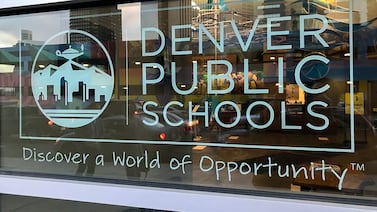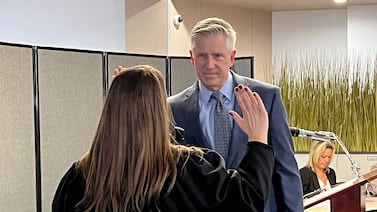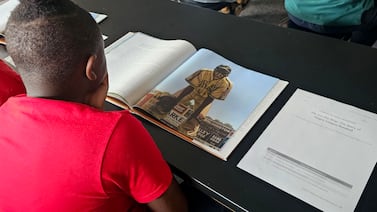The Denver school board is once again politically unanimous — but in the opposite way it was four years ago. In a complete flip, all seven members will now be backed by the Denver teachers union instead of by education reform organizations.
Rob Gould, president of the Denver Classroom Teachers Association, and Carrie Olson, president of the school board, said they see the result as a vote of confidence in teachers.
Olson, who was reelected for a second term, said when she was knocking on doors and speaking to voters, “a lot of people were saying, ‘Oh you’re backed by the teachers union? I support teachers. I love my son’s teacher. I love my daughter’s teacher.’”
The 7-0 board shows that voters trust educators to know what’s best for students, Gould said: “Denver and our voters really said, ‘Wait a minute. Yes, we’re listening to educator voice.’”
But Parker Baxter, director of the Center for Education Policy Analysis at the University of Colorado Denver, said that interpretation discounts the educators who don’t belong to the union, including teachers who work at Denver’s 58 charter schools.
It’s clear, Baxter said, that people interested enough to vote in this election favored the union-backed candidates. “But it’s very difficult to tell what it means,” he said. “I think the rubber meets the road when actual decisions will need to be made.”
In emailed statements, backers of the losing slate called on the new board to keep student achievement and student well-being front and center and to remember that many Denver families value school choice.
“I would have liked to see higher engagement by voters in these critical races,” former Denver school board member Rosemary Rodriguez wrote. “I’m grateful to the voters who cast their ballots and congratulate all the newly elected members of the Board of Education.
“I hope this new board is able to move past the divisiveness of the past two years. Our community needs to come together to develop a clear strategy for moving all students forward.”
After a late surge of ballots on Election Day, and 3½ days of counting, the Denver Elections Division released final unofficial vote tallies Friday night. More than 136,000 people — or 29% of registered voters — cast votes in the citywide school board race, compared with 131,798 in the 2019 election.
Scott Esserman, a parent and former classroom teacher, won the race for an at-large seat on the school board representing the entire city. In a crowded field of five candidates, he garnered 40% of the vote. He will replace term-limited board member Barbara O’Brien.
Olson, a former Denver teacher who was first elected in 2017, easily beat one challenger to win reelection in central-east District 3 with 70% of the vote.
The race in northeast District 4 ended up being closest. Among three candidates, Michelle Quattlebaum, a family liaison at a Denver high school, won 43% of the vote to clinch that seat. She will replace board Vice President Jennifer Bacon, who did not run for reelection.
In southwest District 2, Xóchitl “Sochi” Gaytán’s share of the vote widened to 53% Friday in a two-person contest. Gaytán, a parent and real estate agent, will replace board member Angela Cobián, who beat Gaytán for the seat in 2017 but did not run for a second term.
The four will join board members Tay Anderson, Scott Baldermann, and Brad Laurvick, who were elected in 2019 with the support of the teachers union in a historic “flip.” Before then, Denver had been a national exemplar of education reform and cooperation with charter schools. From 2015 to 2017, supporters of education reform policies had unanimous control of the board.
In the past two years, the union-backed board has undone or halted many reforms put in place by previous boards. For instance, the board voted to reopen two comprehensive high schools — Montbello High and West High — that previous boards had dismantled.
Current board members also got rid of a controversial school ratings system that previous boards used to justify closing low-scoring schools in an attempt to improve academic achievement. And they attempted to delay the opening of a new DSST charter high school, but the State Board of Education overturned that decision.
Gould said the union’s priorities for the next two years — until the next school board election — include advocating for the board to increase mental health support for both students and teachers, ensuring every school has a nurse on site every day, reducing class sizes and caseloads, and boosting support for students with disabilities.
“All those basic things — every school should have those,” he said.
Gould said he’s proud educators made their voices heard over what he called a “juggernaut” of outside spending — more than $1 million — by education reform groups in support of a different slate of candidates. Teachers unions spent less than half that in support of the winning slate.
Gould said he doesn’t see the election results as a vanquishing of education reform but a realization that teachers should be trusted to do what’s right for students.
“Instead of continuing to pile on more experiments, it came to the point where it was like, ‘Let’s listen to the practitioners,’” Gould said.
Denver Public Schools At-large Results
| Winner | Candidate | Votes | Percentage |
|---|---|---|---|
| Marla F. Benavides | 20,066 | 14.7% | |
| Jane Shirley | 21,589 | 15.8% | |
| ✔ | Scott Esserman | 54,663 | 40.1% |
| Nicky Yollick | 7,896 | 5.8% | |
| Vernon Jones Jr. | 32,081 | 23.5% |
Denver Public Schools District 2 Results
| Winner | Candidate | Votes | Percentage |
|---|---|---|---|
| Karolina Villagrana | 8,009 | 46.8% | |
| ✔ | Xóchitl "Sochi" Gaytán | 9,100 | 53.2% |
Denver Public Schools District 3 Results
| Winner | Candidate | Votes | Percentage |
|---|---|---|---|
| ✔ | Carrie A. Olson | 22,146 | 69.7% |
| Mike DeGuire | 9,623 | 30.3% |
Denver Public Schools District 4 Results
| Winner | Candidate | Votes | Percentage |
|---|---|---|---|
| ✔ | Michelle Quattlebaum | 10,903 | 43.3% |
| José Silva | 3,803 | 15.1% | |
| Gene Fashaw | 10,449 | 41.5% | |
| Andrea Mosby | 0 | 0.0% |







